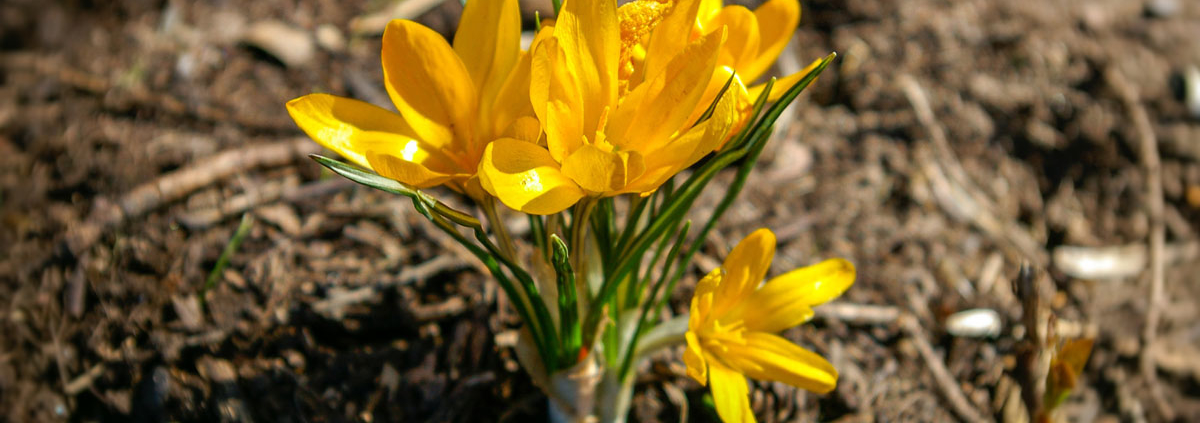Improving Investor Behavior: This Spring, Grow Your Garden and Your Finances
Spring puts me in a mood to organize the yard. It’s nature’s way of encouraging people to clean out the clutter and ready the garden for new growth. This approach is a good way to view your finances as well. Take a step back and look at your financial plan like you look at your garden. Is it overgrown with weeds? Does it need a little pruning? What are you hoping to plant, and where? Will it grow well alongside the others you have planted? Each of these questions serves as easy metaphors for retirement planning.
First, we need a plan. Just like your yard or garden, randomly planting tomatoes or bushes don’t work well. There are considerations: is the light right? Does the location make sense? To answer some of these questions, we need to see the big picture and sketch it out before getting started. I suggest starting with the “why.” What do we want from our yard? Veggies and herbs? A nice lawn on which to play? Perhaps something that’s low maintenance?
What’s your “why” for investing? Perhaps it’s to achieve a specific goal, make a purchase, or fund an education. Maybe you want to donate the result of your work to help others achieve their goals? Or maybe you just want something that’s low maintenance but will grow with you and provide for the future. Whatever your desired outcome, you must first understand what you are after. Without an end goal in mind, your finances are likely to end up in an overgrown mess.
Next, we need to build out a game plan, a method for achieving what we’ve designed. The goal here is progress, not perfection. Like elements of your financial plan, some of your landscaping may take years to mature before your design is realized and perfected. The work comes in keeping things on track. We encourage people to have a written, date-specific, and dollar-specific game plan to accumulate retirement capital. Detailed planning helps determine how much you must regularly put away or save, what your assumed rate of return might look like over what timeframe, and how each element contributes to the bigger picture. This helps you get from where you are today to where you want to be.
Lastly, we need to understand the how. This is where things can get tricky. I’m certainly not a horticulturist, nor do I understand the necessities of certain elements in good soils or all the other important yet specific information required to grow a spectacular garden. But there are plenty of people out there willing to lend a hand. They have the experience, the know-how, and the method for bringing your idea to life. Like pro gardeners, financial advisors can help you design your plan, ensure all the elements are working together, and that, over time, grow as expected. But growth is not without its setbacks. Just as a pro gardener can’t control the weather, neither can a financial advisor control the market. The markets may fluctuate, the economy may strengthen or weaken, and politics may nibble away at your carrots. But what really matters is knowing exactly where you are relative to where you want to go (or expect it to be) and that you adjust accordingly. Adjust your savings, spending, and behavior. Control what you have control over.
This is where our metaphor breaks down a little because if your garden doesn’t grow the way you want, there’s always next year. That’s not true for retirement planning. Every year you wait, or don’t make saving a priority, or promise to “look into it soon” is one less year you have to make sure you’ll have enough. In that sense, your financial future is the most important garden you’ll ever grow. If your only source of food was your garden, you’d probably spend a lot more time making sure to get it right. Why would your finances be any different?
Let’s talk about weeds. No one likes them. They’re difficult to control, and once firmly rooted, they can have a lasting effect on the rest of the garden. The weeds of the financial world come in a few varieties, one of the worst being the noise surrounding you, whether from social media, news, friends, etc. It is the equivalent of letting a few random weeds float into your garden. These seeds are bad ideas and doubt. Maybe you’re not getting the best return? Perhaps you should have invested in that hot stock? Why didn’t you sell when everyone else was buying? These messages only serve to distract you from your goals and create doubt. Doubt leads to making unnecessary changes, and unnecessary changes create income for financial companies. Go after the weeds in your garden mercilessly, and work hard to prevent new ones from taking root.
When you have clarity on what it is that you want, commit to someone by developing a written plan, have the courage to implement and stick with that plan, we believe you experience success. It’s a formula that sounds easy but is much more difficult in practice. Thankfully when it comes to a garden, there are always more tomato plants available at the nursery. The same cannot be said for your retirement. So take the time to visualize what you want, set a goal and game plan, and then have the courage to work toward it. Don’t be afraid to ask for help with the details. That’s what we do as advisors. Design, plan, and grow something that will provide you with joy and happiness for years to come.











